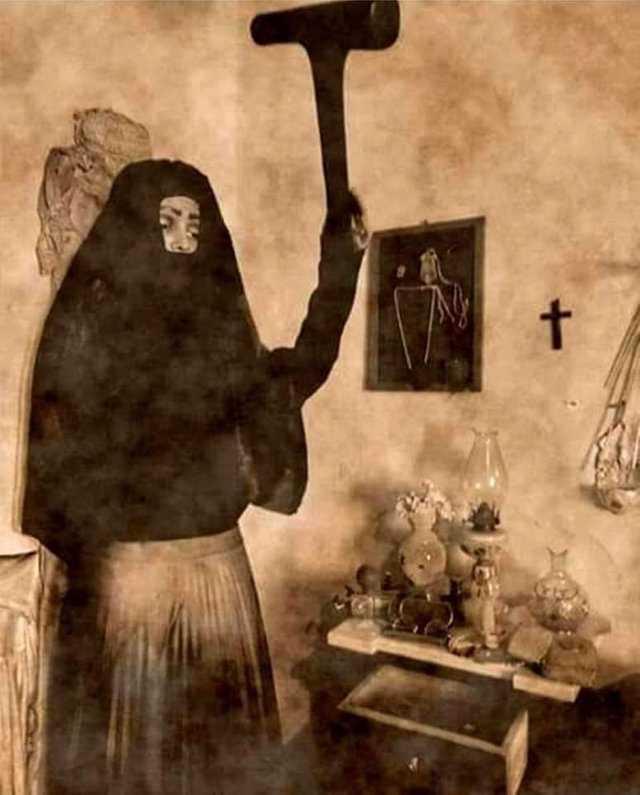
🇮🇹
Come ho gia' detto altre volte, se metto insieme tutte le stagioni fatte in Sardegna, scopro che ho passato sull'isola almeno 3 anni della mia vita.
Anni spesi benissimo.
Oggi si parla molto della "dolce morte" oppure di quelle infermiere o operatrici sanitarie che, pietosamente, hanno dato la morte a dei malati terminali permettendo loro di smettere di soffrire.
La cosa, detto per inciso per la legge degli uomini, e' un reato.
Da questo punto di vista la Sardegna nei secoli passati avrebbe trovato una soluzione.
Premetto che quanto vi vado a raccontare si muove nel sottile spazio che esiste fra realta' e leggenda, visto pero' che sono stati proprio i sardi a raccontarmi la cosa, tenderei a crederci.
Parlo dell'Accabadora.
Il termine viene dallo spagnolo, lingua non sconosciuta in una parte della Sardegna, precisamente da Acabar (finire, terminare).
Parliamo di una donna che aveva il compito di praticare sorta di eutanasia sui malati allo stato terminale.
Veniva chiamata dia parenti dell'ammalato, doveva procurare una morte rapida e piu' o meno indolore, per questo non riceveva alcuna ricompensa in denaro, soltanto prodotti della terra.
Completamente vestita di nero, agiva sempre di notte entrando nella casa del malato col viso coperto.
Venivano tolti al malato amuleti ed immagini sacre, la morte pare avvenisse con un colpo sulla fronte con un bastone di ulivo (su mazzolu) oppure dietro la nuca con un colpo secco tirato con un martello di legno chiamato Giogo.
Come vi dicevo c'e' chi sostiene che questa figura non sia mai esistita e chi invece e' convinto che, sopratutto nei secoli scorsi in alcuni paesi dell'entroterra c'era chi si dedicava a questa attivita'.
Fra realta' e leggenda come vi dicevo.
Michela Murgia ci ha scritto un libro "Accabadora" mentre Enrico Pau ci ha fatto un film.
🇬🇧
ACCABADORA
As I have already said other times, if I put together all the seasons spent in Sardinia, I discover that I have spent at least 3 years of my life on the island.
Years well spent.
Today there is a lot of talk about the "sweet death" or about those nurses or health workers who, mercifully, gave death to terminally ill patients allowing them to stop suffering.
Incidentally, according to the law of men, this is a crime.
From this point of view, Sardinia in the past centuries would have found a solution.
I will start by saying that what I am going to tell you moves in the thin space that exists between reality and legend, but since it was the Sardinians who told me the story, I would tend to believe it.
I am talking about the Accabadora.
The term comes from Spanish, a language not unknown in a part of Sardinia, precisely from Acabar (to finish, to terminate).
We are talking about a woman who had the task of practicing a sort of euthanasia on terminally ill patients.
She was called by the relatives of the sick person, she had to cause a quick and more or less painless death, for this she did not receive any monetary reward, only products of the earth.
Completely dressed in black, she always acted at night entering the sick person's house with her face covered.
Amulets and sacred images were taken from the sick person, death apparently occurred with a blow to the forehead with an olive stick (su mazzolu) or behind the neck with a sharp blow struck with a wooden hammer called Giogo.
As I was saying, there are those who maintain that this figure has never existed and those who are convinced that, especially in the past centuries in some inland towns there were those who dedicated themselves to this activity.
Between reality and legend as I was saying.
Michela Murgia wrote a book "Accabadora" while Enrico Pau made a film about it.
è la prima volta che sento parlare dell'Accabadora. Grazie per avercene parlato. Vedo che il problema dell'eutanasia è un problema antico e che forse una volta non c'erano molte limitazioni.
Downvoting a post can decrease pending rewards and make it less visible. Common reasons:
Submit
Anzi erano personaggi riveriti
Downvoting a post can decrease pending rewards and make it less visible. Common reasons:
Submit
Anche se fosse una leggenda fa comunque capire quanto l'argomento del fine vita fosse sentito già in tempi antichi!
Purtroppo noi moderni ci nascondiamo dietro l'ipocrisia!
Downvoting a post can decrease pending rewards and make it less visible. Common reasons:
Submit
Sulle spalle di chi soffre
Downvoting a post can decrease pending rewards and make it less visible. Common reasons:
Submit
Ho letto il libro della Murgia, molto bello.
Downvoting a post can decrease pending rewards and make it less visible. Common reasons:
Submit
Downvoting a post can decrease pending rewards and make it less visible. Common reasons:
Submit